
This lush period piece starring Kelvin Harrison, Jr. in a very different and difficult role is based on a surprising little- known story. It deals with race, romance and revolution and musical genius. Harrison, having a background in classical music, and it helps that violin was the first instrument the actor played as a child. You actually get to hear what is left of composer Chevalier de Saint-Georges’ actual works adapted and performed in the film.
How did we not know about this French Knight before? He was born Joseph Bologne in 1745, the illegitimate son of a wealthy Guadeloupe plantation owner and his Black slave. Bologne’s father sent him for a good education where his formidable natural talent as a violinist and composer developed.
Bologne had his challenges as a “mulatto,” (half white, half black,) in an upper crust school. But his genius propelled him. The film opens with Bologne, already known as Chevalier de Saint-Georges, and renowned for his swordsmanship in the French army.
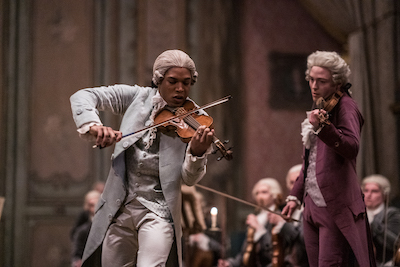
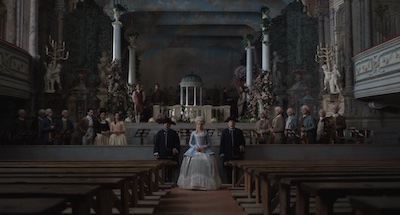
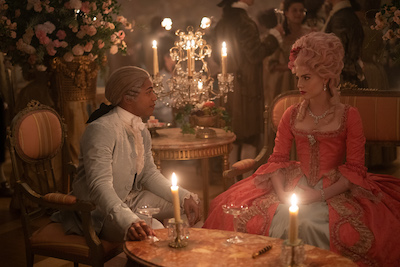
The real Chevalier was a striking figure described by historians as well-dressed, powdered wig and all, with long lashes and a beauty mark on his face. In this film version Harrison Jr. struts across the screen as self-assured, self-centered and arrogant, but he could easily back it up. Harrison’s attitude is spot on showing how Joseph wanted his place at the table which was perceived as a threat to the other aristocrats.
Director Stephen Williams (Tulsa Race Massacre, Watchmen) and Writer, Stefani Robinson, follow the ups and downs of this man’s life and loves leading up to the French Revolution. Yes, even Marie Antoinette (Lucy Boynton – The Pale Blue Eye) plays a dramatic role in this intricate tale. She is supportive of the Chevalier to a point, as long as it doesn’t interfere with her power. Williams takes some liberties with the history and music, since much of the Chevalier’s compositions did not survive.
The film starts with the Chevalier challenging Mozart to an on-stage musical duel, which probably never happened, showing off before the elite crowd. Harrison does well making his violin virtuosity believable. When he is given the chance to create his own opera, he auditions sopranos for the lead, even though he is already enamored with the beautiful Marie-Josephine (Samara Weaving) and her mellifluous voice. But her husband, the jealous and powerful Marquis de Montalembert, (Marton Csokas) won’t be easy to convince.
Plus he has turn down influential opera diva La Guimard’s advances (Minnie Driver). Driver is known for her singing, but here, she is to be the pushy one without Marie-Josephine’s glorious sound. As Joseph and Marie-Josephine rehearse, while her staunch royalist husband is away, they fall in love and have a sexy affair. During this time, his mother, Nanon, (Ronke Adekoluejo) shows up, seeing her for the first time in decades. She is nurturing, but also challenges him to be a man of honor.
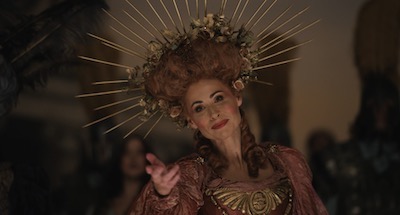
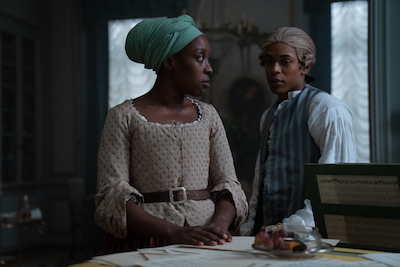
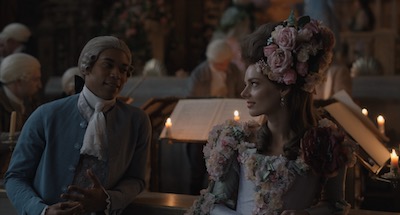
The production design, hair, wigs, makeup and beautifully tailored wardrobe are so well done, they could be destined for awards. Cinematographer Jess Hall does a fine job capturing every detail of that era beautifully using soft focus to enhance the sumptuous sets. He also creates smooth transitions from one scene to another using cross fades of sunsets and clouds.
You’ll be asking “Is this true?” until the end when known facts of Joseph Bologne’s life are spelled out on the screen. Williams and Robinson create a richly textured production with a superb cast led by Harrison, Jr, a good script and an astounding history, nearly erased. After centuries, glad to see the Chevalier’s music get another play.
Searchlight Pictures 1 hour 47 minutes. PG-13









